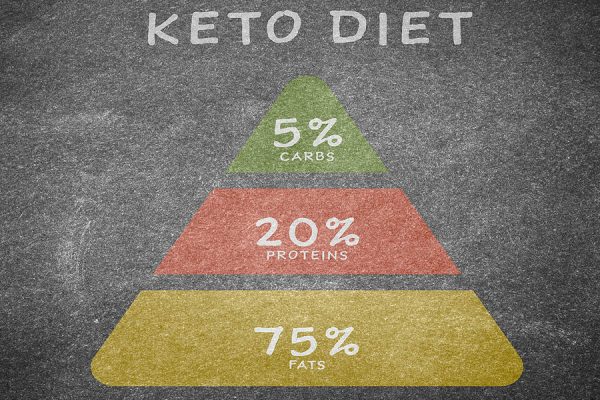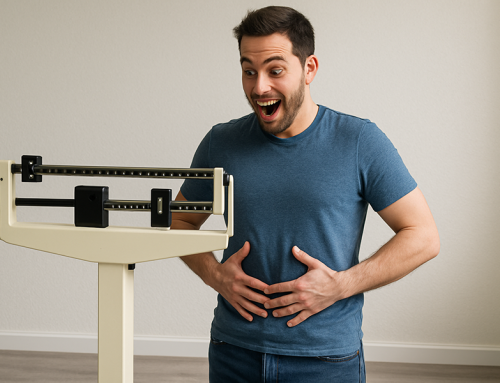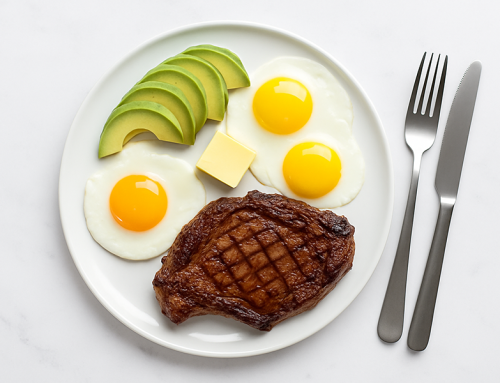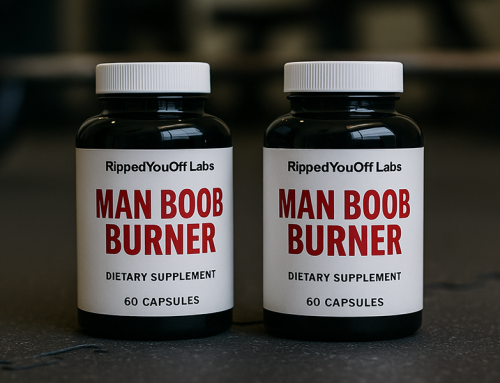Right up front, let me state my position: I do not believe the very low-carb, very high-fat ketogenic diet (“keto”) is the right fat loss plan for most people. Especially not as a first choice or the place to start. Why not? Because the keto diet is a restrictive diet that removes an entire food group and sometimes wrongly demonizes that food group – carbs. Also, an overwhelming body of scientific evidence shows that the keto diet is no better than any other diet in the long term.

However, I’m not writing this to bash anyone doing keto with obvious success. I’m here to clear up keto diet lies and keto diet myths. There is such a thing as a scientific keto diet. There is such a thing as a well-informed person who goes on keto for a specific reason that’s perfectly logical. There is such a thing as a person who succeeds on keto, including successful maintenance. Keto diets can work, and are not necessarily harmful. I’m not saying it’s wrong if someone wants to try keto or has enthusiasm for endorsing the diet.
What is wrong is the way so many people continue to misrepresent the keto diet, especially the reason why it works, how well it works compared to other diets and what are the potential downsides. Keto diet myths and misinformation about low carbs are being spread by keto advocates including doctors, nutritionists, enthusiastic followers, the diet food industry, the mainstream media and of course, social media.
When a famous social media influencer hops on the keto wagon and praises it, millions of people can instantly hear a lie. Those followers can just as easily spread it with one click in a repost, retweet or share. Keto diet myths are so widespread, you almost can’t avoid them. That’s why I’m writing this. Someone has to counter it.
This is a heartfelt message of concern because I don’t want to see you waste time getting sidetracked on a diet that’s not right for you. I don’t want to see you get confused or mislead about why diets work. I certainly don’t want to see you damage your health.
My concern doesn’t end with keto. New diets will keep coming down the pike, and if you buy into false beliefs about how weight loss diets really work, you’ll easily be lead off on another dietary rabbit chase in the future. I’ve seen this happen for years, and it’s still happening today.
Recently, a young man posted on the Burn the Fat Feed the Muscle Facebook page. He was feeling frustrated with being unable to lose fat and achieve the body he wanted. He was asking for help. He was discouraged about stomach fat, and what he called “man boobs” and a “dad bod.” Then another man showed up and posted three words: “Check out keto.”
A dialogue began between the two. Very quickly, the posts made by the keto advocate spiraled down into an abyss of misstatements and nonsense. And yet the young man wanting fat loss help appeared intrigued and was asking more questions. Soon the keto advocate had shared his 80-pound weight loss testimonial and was linking to keto resources, programs and gurus online. “Check out this you tube video.” “Check out this guy’s picture.”
It didn’t take long for other members of our informed group to jump in and try to call out the falsehoods. (Not to mention, admonish the visitor for the poor etiquette in preaching about keto in a non-keto group). Some of the claims this guy made were doozies. The whopper was when he insisted he had a calorie maintenance level of 2000 and lost weight eating 3000 calories a day (a 50% surplus). That’s when I stepped in.
I said, “We’re not a keto group, but keto discussion is okay. Even debate is okay when it’s civil and constructive. What’s not okay is pushing low carb rhetoric that has no basis in science. I won’t let that stand on our board without challenging it.” There was no back and forth. No debate this time as I’ve gotten into with others in the past. But he didn’t budge in his position either.
I get the feeling that a lot of keto enthusiasts really believe what they’re saying as they repeat low carb party lines that are actually dead wrong. That’s why part of me didn’t want to use the word lies in the title of this article. I don’t want to call anyone a liar, I’ll just say people get emotionally involved with an idea, and they may be misinformed, but not realize it. He really believed there was some kind of magic in keto that lets you eat in unlimited amounts as long as your carbs are low. That’s how the diet is widely promoted.
But let’s call a spade a spade. When we look at claims like these by themselves, not the person it’s coming from, I have no hesitation calling them bald-faced lies, because science doesn’t back them up. Some of the information spread by low carbers is delusional! No one loses body fat in a calorie surplus, let alone a 1000 calorie surplus. That’s one of a half a dozen lies and keto diet myths we’re about to clear up.
When a person learns the truth, he or she often finds the curiosity or fascination with keto disappears because they realize it’s nothing special. They understand they could get the same results on a more balanced, more sustainable diet with no forbidden food groups. They also realize they have a lot of choices for their dietary approach and there is no single best diet, so they are free to choose one that suits them.
By seeing these lies get exposed, you will also find yourself better equipped to think critically about all diets and all weight loss claims. When the next big fad pops on the scene, you’ll see parallels and won’t get drawn in by false promises. Or you may go ahead and try a new dietary approach. There’s nothing wrong with experimenting. But if it works, with this new insight, you’ll understand why it works. You’ll know weight loss happened because the diet helped you create and sustain a calorie deficit.
So now let me uncover and expose the six most dangerous and damaging keto diet lies and keto diet myths.
1. You can lose fat in a calorie surplus because you’re in ketosis.
The man promoting keto on our Facebook page was wrong. You can’t lose fat in a calorie surplus. It doesn’t matter if you’re in the metabolic state of ketosis. It doesn’t matter if you’re eating zero carbs. If you eat nothing but fat and protein and you still manage to get in a calorie surplus, you’ll gain fat. That’s how energy balance works in the human body.
Maintaining a calorie deficit over time may be more complicated than saying, “it’s calories in versus calories out” or “eat less than you burn to lose fat.” That’s because how many calories you burn can change. Body weight can change. Metabolism can change. But the laws of energy balance don’t change any more than the laws of gravity.
3500 calories to lose a pound? Is this formula actually wrong?
2. Carbohydrates are the reason for fat gain and obesity, not excess calories.
Many spokespeople for low carb diets, including authors and even medical doctors, paint carbohydrates as bad guys. Some not only say carbs are fattening and should be avoided, they go a step further and say that excess calories are not the reason you gain fat. They pin it completely on carbs and the subsequent hormonal response to those carbs.
Of course, it’s true that if you eat so many carbs it pushes you into a surplus, you’ll gain fat. And it’s true that’s likely to happen when the carbs you’re eating are processed, especially sugar. Refined carbs are absolutely a contributor to the obesity crisis. But even if a low carb advocate doesn’t deny that calorie surplus is the cause of fat gain, they are still wrong if they pin the blame for surplus calories on carbs alone.
We know for a fact that it’s the combination of sugar and fat together, especially when you also add salt and other artificial flavor enhancers, that food becomes hyperpalatable. If you want to blame something for caloric excess, point the finger at ultra-processed, hyperpalatable food, don’t blame an entire macronutrient.
What Ultra Processed Food Does To Your Body
3. Fat gain is a hormone issue, and insulin is the culprit, as it drives fat storage.
Both research and simple observation show that keto works if you can stick with it. We’re not suggesting keto doesn’t work. One thing still debated however, is why does keto work? There are two sides with opposing hypotheses:
One is the calories in vs calories out model (CICO). This is the prevailing belief which says that a calorie deficit is required for fat loss. This doesn’t mean you have to count calories or track macros to lose weight. This means that whether you count calories and have a deficit or you don’t count calories and have a deficit, either way, the end result is the same – you lose weight. Science supports the CICO model so strongly, it’s hard to believe it’s ever questioned.
The other is the hormone hypothesis: aka carbohydrate-insulin model of obesity (CIM). This is the belief held by many low-carb advocates, which claims that carbs stimulate insulin, insulin promotes fat storage and insulin prevents fat release from the fat cells.
Mechanistically, it’s accurate to say that insulin is a storage hormone and high levels prevent fat release into circulation. Insulin is indeed a hormone responsible for shuttling fat into fat cells, but that only manifests as weight gain if you’re in a calorie surplus. If you’re in a deficit for the day, you’ll have a net fat loss for the day regardless of any post-meal insulin spikes. (And regardless of how high the percentage of calories are coming from carbs).
By the way, insulin is also the hormone that delivers amino acids into muscle cells for growth. It is not a bad hormone any more than carbs are a bad macro. Research simply does not support the carbs-insulin model.
4. You can eat as much as you want on keto and still lose weight.
In a calorie surplus, you will gain body weight. Some of that body mass can be muscle if you’re strength training with progressive overload. But excess energy beyond what you can use to support muscle (calorie surplus) is what drives fat storage.
Eating too many carbs will put you into surplus, but so will eating too much fat. It’s less likely that you’ll overeat protein, but even too much protein will turn to fat. Too much of any food – even the healthiest of healthy “superfoods” will turn to fat. That’s how it works. Foods don’t turn into fat. Macros don’t turn into fat. Excess calories do.
We could say there’s a shred of truth in this “eat as much as you want” idea though. What if you followed a certain diet and you ate as much as you wanted and because of the type of foods you chose, you felt full and satisfied, and yet you were still in a deficit?
That’s an interesting question, because if the way a diet is designed could reduce your hunger or even increase satiety for any reason, whether it was high protein, high fiber, high fat, controlling hunger hormones, or being in a state of ketosis, then a person saying he ate as much as he wanted is truthfully describing his experience.
But the ambiguity of that statement is the problem. Keto advocates use “I eat as much as I want” to imply that calories don’t count when you’re in ketosis. They refer to it as meaning you can literally eat as much as you want – as far into surplus as you want – and still lose fat. That’s where it becomes a lie.
Keto diets may in fact help control appetite. That may be the real mechanism for why keto works for some people. If a diet helps reduce appetite, then it’s a lot more likely that someone would say, “I ate as much as I wanted and still lost weight.” That’s because they were in a deficit but not hungry, not because they were in a surplus and lost weight anyway.
Calorie denialism – why it’s hurting your fat loss efforts
5. The ketogenic diet is superior to other diets.
Despite insistent claims of superiority by ketogenic diet advocates, a vast body of research shows that ketogenic diets work, but are no more effective than any other diet.
Studies showing low carb diets are more effective do exist, and low carb advocates often selectively pick them as “proof” that their way is better. The truth is, most of those studies were short term. Seeing more weight loss in the initial weeks on keto is not unusual. But that’s because of water weight and glycogen loss, not greater fat loss. Results even out in longer studies.
Also, many studies where low carb diets looked superior were not properly controlled. To confirm the actual caloric intake, subjects must have their food intake measured in a metabolic ward. They are not trusted to self-report calories accurately.
In addition, for a fair comparison, the study has to be set up so the calories and protein are held constant and the only variable tested is differing amounts of carbs and fat. In all the studies that do this, (match for calories and protein), the alleged advantages of low carb diets disappear. Both the low carb and the high carb diets produce similar results. This reveals that it was adequate protein helping weight loss the most, not the removal of carbs.
From a weight loss perspective, there’s no “metabolic advantage” to keto diets – they are only a way to control calories. If anything, it’s the higher protein that gives a small advantage, not the lower carbs.
6. Diets high in overall fat and high in saturated fat are harmless.
Keto advocates often claim not only weight loss success, but improvements in health as well. Could a high fat keto diet be healthy? This is still being debated and researched for a lot of reasons. One question is, how much of these health benefits came from the foods or macros eaten versus the benefits imparted by the weight that was lost? When you lose weight, your health usually improves, regardless of which diet you used to lose the weight.
Even if we sorted that out, it’s still a difficult question to answer because so many variables could affect your health when on keto, including which foods are eaten, how processed the foods are, what types of fats are consumed, how much of the fat is saturated, what kind of saturated fat it is, what kind of exercise is done and what does the rest of a person’s lifestyle look like (sleep, stress, alcohol, smoking and so on). Genetics are also a huge factor.
This question is probably best answered by your own doctor in the form of having your blood work tested. Paradoxically, given many people’s fear of dietary fat, some people monitor their blood lipids on keto and actually do see improvements on keto, particularly triglycerides.
But on the other hand, I’ve heard countless reports – directly from medical doctors as well as from individuals – of keto having a very negative effect on blood lipids. In particular, increases in LDL cholesterol are common and high LDL is a major risk factor for cardiovascular disease. Upon returning to a more normal balanced macro diet, their blood cholesterol returned to a healthy level so there was little question about the cause of the rise.
What’s alarming is when a person goes on keto and doesn’t even monitor their blood work because they’ve been convinced by low carb doctrines that eating a high fat diet is good for you and that eating a high carb diet is bad for you. It’s not that simple at all.
Healthy eating isn’t just about macros. Food quality always matters. A healthy balance of dietary fats matters. The quality of carbs matters – a lot. The word “carbs” could refer to refined sugar or to fruits, vegetables and whole grains. Lumping all carbs together as having equal effects on health is ludicrous.
In some parts of the keto community, eating fatty cuts of red meat, bacon, butter, coconut oil and so on in huge quantities is glorified. Yet this could be very misguided, especially for people with certain genetic dispositions. It could be downright reckless if blood work isn’t even checked. A keto diet can probably be put together sensibly to support health, but keto is not always practiced that way.
Parting thoughts.
There’s a nutrition researcher I sometimes follow who lectures all over the world. He’s one of the experts who has debated low carb advocates head-on, including best-selling low carb book authors. The keto diet is a topic he includes in most of his nutrition talks.
When he speaks to an audience, he always does a survey. He asks, “How many of you have tried a ketogenic diet before? If you have, please stand up.” On average, he says, 90% of the room stands up. Then he says, “Please keep standing for a moment. Now, how many of you today are still following a keto diet? If you’re not, please sit down” On average, he says only 10% of those who stood up are still standing.
This is incredibly revealing and though it’s an informal survey, it matches almost exactly what we see in the research. About 90% of keto dieters fail to remain complaint within a year. They may have started with only about 20 to 40 grams of carbs per day, but even if they stay on relatively low carbs, they’re eating 100, 120, 140 grams a year later if they’re not off the wagon completely. The moral is, keto diets are not sustainable for a lot of people. Therefore, in hindsight, most people look back and see it was only a quick fix. Many end up back at square one.
If someone is in the small percentage who find keto is sustainable, enjoyable and effective, both for weight loss and for health, that’s great. I congratulate them. The most important thing is that the myths, misinformation and lies about how keto works finally stop and that everyone shares the truth and nothing but the truth:
All diets work because they put you in a calorie deficit. There is no insulin fairy, no calorie-cancelling unicorn, no metabolic magic to be found in keto or any other popular fad diet.
Train hard and expect success,
Tom Venuto,
Founder & CEO, Burn the Fat Inner Circle
Author of Burn the Fat, Feed the Muscle
Author of The BFFM Guide to Flexible Meal Planning For Fat Loss
PS. Members-only content: By the way, a whole other question is, “what about keto diets and gaining muscle?” This has been a topic of conversation throughout the fitness, bodybuilding and strength training world over the last year. I answer this question in the members-only podcast here
PPS. What do you think? Have you heard this kind of low carb rhetoric too? Does it bother you? Or in the nutrition circles you travel in, are these 6 keto diet myths clear and obvious nonsense that no respectable person would speak of? Let me know in the comments below

Tom Venuto is a natural bodybuilding and fat loss expert. He is also a recipe creator specializing in fat-burning, muscle-building cooking. Tom is a former competitive bodybuilder and today works as a full-time fitness coach, writer, blogger, and author. In his spare time, he is an avid outdoor enthusiast and backpacker. His book, Burn The Fat, Feed The Muscle is an international bestseller, first as an ebook and now as a hardcover and audiobook. The Body Fat Solution, Tom’s book about emotional eating and long-term weight maintenance, was an Oprah Magazine and Men’s Fitness Magazine pick. Tom is also the founder of Burn The Fat Inner Circle – a fitness support community with over 52,000 members worldwide since 2006. Click here for membership details






Well done, sir, and thanks for the great free content
Hi Tom, what about the effects of following a keto diet long term?
Angela, that’s part of the challenge. Long term sustainability is difficult on keto where carbs are only 40g a day or even only 20g a day. Some people can do it because they have a personal preference for the richness of a high fat diet; maybe they are good at keto cooking too. But most people can’t stick with it. Some folks stay on a low-ish carb lifestyle and maybe take the carbs up to 60, 80, 100, 120 g – still low but likely no longer ketogenic and they might find that more sustainable. As for health effects, it probably depends on the quality of the diet, like how much saturated fat and what kind of saturated fat, are processed meats used, how much healthy and mono fat is included and how many veggies and how much fiber? It also depends a lot on genetics. some people with the genetic predisposition end up with very bad blood lipid numbers on keto and doesn’t even take long term to manifest.
What about diabetics? My mom reversed her diabetes with ketogenic dieting and has stuck with it religiously for over 2 years now since her initial diagnosis. Diabetes raises the risk for myriad diseases. Carbohydrates may even lead to cataracts (https://www.ncbi.nlm.nih.gov/pmc/articles/PMC2891456/). I think perhaps your current paradigm is getting in the way of new information, Tom. People don’t generally binge on fat and protein. They binge on carbs, which are highly addictive and yes, outside of ketosis, hunger is much more urgent and frequent. This effect alone can explain the success of ketogenic dieting. Chronically high insulin levels lock up fat stores which is why obese people can get so hungry, and people in ketosis can go days without food. Angus Barbieri in the 1960s fasted for over a year and went from over 400 pounds to 185 pounds. He said he felt the best in his life while he was fasting. He wasn’t hungry. That’s ketosis. It becomes effortless to ignore any urges to eat (they are slight and easily ignored). I’ll leave you with this (a man who advocated an all meat diet after living with eskimos who had no heart disease, cancer or diabetes): https://www.atlasobscura.com/articles/all-meat-diet
Hi Jeffrey. Thanks for your comments. I appreciate your perspectives. My article wasn’t about the use of ketogenic diets to treat diabetes any more than it was about using keto diets to treat epilepsy. There are some legit clinical applications for keto. My post was about the false claims still being circulated about the so called advantages of keto for weight loss and also, importantly, the reasons it works and the sustainability question in the m majority of the population. Please take what I wrote in the context in which it was written. I appreciate you referencing pub med but that study doesn’t even seem relevant to my discussion, and it looks like it references animal studies and associations, not humans and cause-effect. The other two references are just stories (and the Stefansson story is pretty stale at this point. An all meat diet is pretty dumb for people in the modern world who have access to any foods compared to those who have no other choice than to hunt what’s available to eat in the arctic). PS. Very happy to hear about your mom. Im well aware that some people do well with keto for certain specific health issues, and it can work for weight loss if someone can stick to it, and yet it looks to me like the evidence does not support keto as any better than any other diet for weight loss.
How about the fact that the eskimos didn’t have the chronic diseases of modern civilization? What about my comments regarding hunger? …to the point that one man was able to fast for an entire year (fasting is the quickest way to get into ketosis). I think these are absolutely relevant to weight loss. Most people fail trying to quit smoking or overcome drug addiction, but that is no reason to discourage those goals. Obesity, metabolic syndrome and cataracts are just examples of many chronic diseases that come from eating carbohydrates. Some people now refer to Alzheimer’s disease as “type 3 diabetes”. Also, carbohydrates, unlike fat and protein, are completely unnecessary for survival. You can live your entire life and never eat a single gram of carbs and be perfectly healthy. The same cannot be said for fat and protein. Obviously our bodies have evolved to require the latter two macronutrients, with some ability to deal with carbohydrates, but only at a serious cost to health over the long term.
Chronic disease incidence is not solely a matter of carb intake. There is the type of carbs (processed or unprocessed, fiber content etc), everything else in the diet, overall lifestyle, and also genetics. The control of hunger / appetite is one of the biggest issues and probably the biggest legitimate benefit of a higher fat, lower carb diet for some people. That is likely the primary reason it works, not b because of insulin “locking up fat in cells” or anything else. If someone is not hungry, they eat less (thus, calorie deficit = fat loss). There’s a decent handful of people who will testify that when on very high carb, very low fat diets, they are hungry all the time and when they went to higher fat and low carb that was “the” thing helped out with their hunger. I totally understand and acknowledge that. but that’s not everyone. I know people who went in the opposite direction – plant based with very very high carbs and low fat and adequate protein and they were not hungry and it fixed their health problems. Everyone is different. Prolonged fasting is a terrible idea for fat loss and even worse for muscle retention. The fact that one man fasted for months is really irrelevant to the conversation we’re having with the broader population because prolonged fasting is totally unsustainable and completely miserable and not socially acceptable. talking about chronic diseases and carbohydrates is too generalized, context is everything. You can’t lump all carbs together, just like you cant lump all fats together. The argument that there’s no such thing as an essential carbohydrate is technically accurate. There are essential aminos and essential fatty acids and essential vitamins and minerals but not, technically, essential carbohydrates. but that doesn’t mean low carb diets are optimal or maintainable by everyone and its not a good argument that everyone should avoid carbs. Surviving and thriving are not the same thing. I could write a whole blog on that “no such thing as an essential carb” idea, and probably will. I wish you the best success with whichever diet you choose but. by no means is keto any kind of game changer or any better than any other diet as weight loss is concerned.
“All diets work because they put you in a calorie deficit.” But are all deficits the same? Is a deficit created by cutting carbs the same with a similar-calorie deficit created by cutting fat? They will cause similar weight loss, but will they result in the same body composition?
All deficits are most certainly not the same in terms of body composition. For example, whether or not there is adequate protein can influence the composition of the weight lost. With inadequate protein, the risk of some of the weight loss coming from muscle is higher. So caloric deficit is a mandatory condition for weight loss to occur, but is certainly not the only thing to focus on. macros do matter. (and of course food quality for health). Interestingly however, if the calories and protein stay the same, in controlled studies, there is not much difference in weight loss either way by manipulating the carb and fat amounts. In ad libitum / free living situation, some people will however eat less automatically when carbs are restricted.
Unfortunately there is no metabolic magic in the keto diet. I have long kept a food log and as tedious as it is, tracked my calories. I was not interested in losing weight, but wanted to test the fat burning magic. I kept my calories constant and dropped my carbs to less than 40g a day. At the end of 16 weeks I was within 1lb of my starting weight….BUT I had added 3in to my waist. UGH!!!! That was not the effect I was looking for! But makes perfect sense if you look at the metabolic cost of each calorie. What was worse was that it took me over 1yr to get that fat off. There were other side effects from eating like that (hard to sleep, reflux, constipation, achy joints). Not the trade-off I was looking for. I’m sorry I got sucked in to the hype and didn’t think through it all the way. Lesson learned. Hopefully your article will help people like my former self.
Javier, thanks for sharing your experience. Indeed no magic and sometimes the opposite – some unpleasant effects